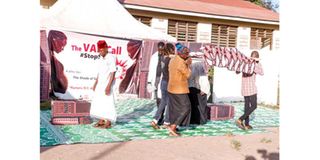Kwale group using plays to raise GBV awareness

A scene from The VAR Call, a play used to raise awareness of gender-based violence, on November 23. A group, called The Shades of Samba, sensitises communities to the dangers of teenage pregnancy, early marriage and sexual violence.
What you need to know:
- The theatre group performs in local communities to reach out to various stakeholders and evoke emotions around violence, especially that against women and girls.
- The young actors under The Shade of Samba also use performance arts to generate income.
A community-based organisation in Kwale County has resorted to performance arts to raise awareness of gender-based violence (GBV).
Through plays, poems, drawings, songs, dance and comedy, Samba Sports Agenda, which is a youth-friendly centre, targets the community with content that is familiar to them, centred on teen pregnancy, early marriage, defilement and drug abuse.
The theatre group, under the name The Shade of Samba, performs in local communities to reach out to various stakeholders and evoke emotions around violence, especially that against women and girls.
“Kwale is among counties that continue to report cases of violence against children, especially sodomy and defilement, that, in turn, results in early pregnancies and school dropouts. Unfortunately, society sees this as normal,” said Samba Sports Partnership Manager Mohammed Mwachausa.
The VAR Call
He was speaking during the first show of a play dubbed ‘The VAR Call’ in Matuga. Security, education and community officials and students, among other stakeholders, were invited to watch the free play.
“It’s a VAR call because we are relating it to a football match where a video assistant referee (VAR) is used when the referee fails to decide on a player’s move.
“There have been many deaths as a result of GBV in Kenya. In Kwale, 75 per cent of the girls in school have had their rights violated in one way or the other. It is either they have been touched inappropriately, forced into intercourse, or coerced into doing what is not right. Yet people see this and do not act,” said Mr Mwachausa, who is one of the producers of the play.
Tragicomedy
The tragic play is centred on a teenage girl who grows up in a home where parents fight. Feeling ignored, she decides to escape to her male friend’s house. Unfortunately, the male friend’s father defiles her.
She gets pregnant and later terminates it when the secret is out that she was defiled by her boyfriend’s father.
In between the scenes, the play, acted in Kiswahili, takes the audience through a rollercoaster of laughter, suspense, and finally tears following the tragic death of the teenage girl.
“We had to show the magnitude of the damage that society has done ignoring the girl child. We are saying that there is an urgent need to change how we approach this and find an alternative way to address the issue,” said Mr Mwachausa.
He explained that getting a VAR means more people should come on board to fight GBV.
The play’s ending opened up the floor for the viewers to give remarks on the lessons learnt from various scenes.
He noted that most of the time children end up neglected because of differences by their parents, who forget that their fights psychologically affect the girls, prompting them to take certain decisions.
“This is a call for urgency. We cannot watch heinous acts taken against girls without responding,” Mr Mwachausa said.
Kwale has been reporting rape, defilement, teenage pregnancies and early marriages for years, with culture being cited among the reasons for the cases.
Parents under fire
Kwale Youth Affairs director Kent Simiyu said most parents have failed in their responsibility.
“Teenage pregnancy cases continue because parents are no longer taking responsibility. How does a parent feel okay being given money by their daughter who goes to school without questioning?” asked Mr Simiyu, who spoke after the play.
Lungalunga sub-county children’s officer Zephania Apoko said in the last quarter, data from the children’s department, chief, and hospitals showed there are more than 4000 cases of teen pregnancy in the county.
He listed drought, poverty and the remoteness of some schools and government services as some of the causes of GBV.
“Parents may not even be able to feed themselves, they might not also afford money to buy sanitary towels,” said Mr Apoko.
This comes as data from the County’s Department of Health indicated that cases of teenage pregnancy have declined this year to 17.2 per cent, from 39.8 per cent recorded in 2016.
Despite cases of GBV being in existence, there have been interventions going on other than using arts to raise awareness of the vice and prevent it.
Partnership
Governor Fatuma Achani noted that collaboration between the county government, human rights organisations and community organisations is among the major contributors to the decline.
She also added that the county government’s Elimu ni Sasa programme meant to educate bright students has helped keep most of the girls in school and parents at peace without worrying about where to get school fees.
Mr Mwachausa said the group will continue its performances and use the plays as an income-generating activity for the young actors.





